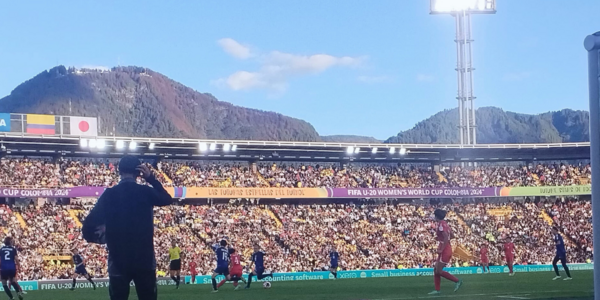Female empowerment through football – The U20 World Cup in Colombia as a case study
On Sunday 22 September 2024, the 11th edition of the U20 Women's World Cup came to an end with North Korea beating Japan in the final after a total of 52 matches. This World Cup final round brought a number of firsts. For the first time, an Austrian women's team qualified for a FIFA World Cup. With the increase from 16 to 24 teams, each of the six FIFA continental associations was allowed to field at least one additional participant. With the exception of Oceania, this increase was also a positive step from a purely sporting point of view.
As is well known, women's football is unfortunately still subject to many stereotypes and derisive comments in Europe, and even more so in the structures of the Global South. ‘Future Stars of Football’ is the fortunately gender-neutral slogan on all team buses. And FIFA has indeed at least learnt from the incident involving the Spanish association boss Luis Rubiales.
Since this World Cup, each team has been obliged to appoint its own Safeguarding Manager, who is the point of contact in the event of any sexual harassment of players. Lucy Cunningham has also been appointed as a central FIFA officer who pursues a strict zero-tolerance policy on this issue and also investigates anonymous reports. Flyers with contact addresses are displayed in the dining rooms and dressing rooms for all to see. FIFA has also set up an internal social network for all players to facilitate cross-team communication. While these steps can be seen as positive, there are of course still numerous points of criticism. Although the world governing body is sitting on billions in reserves and is constantly concluding new lucrative sponsorship agreements with Arab and Chinese companies, the incomprehensible zero funding for all participants remains in place. It is therefore foreseeable that with increasing professionalisation, fewer and fewer clubs will be prepared to release their players for the junior women's tournaments in future, partly due to the lack of compensation payments from FIFA to the clubs in the event of injuries.
Superpoderosas – the superior
In terms of spectator numbers, the Colombian team, affectionately known as the ‘Superpoderosas’ (the superpowers), equalled a record set by the home team in 2012 with an average attendance of over 30,000 until their elimination in the quarter-finals. Otherwise, however, the attendance figures were a far cry from those of the 2019 and 2023 A World Cups, with only Spain just making it over the 10,000 mark in the round of 16 against Canada. Most matches had to make do with just one to three thousand people in attendance, which was partly due to complicated online ticketing systems and partly due to a lack of willingness to move kick-off times to earlier starting times, in contrast to the U20 Men's World Cup in 2011, in order to be able to invite school classes, which ensured full stadiums and a great atmosphere back then.
Since the home team was eliminated in the round of 16, public interest has fallen to almost zero. In bars and restaurants, people often don't even realise that the U20 World Cup is taking place, while national and international men's football matches are being shown on the big screens. The national media and the two major free TV stations are creating an artificial festive atmosphere, but this is not reflected in the viewing figures at all.
Women's football in Colombia will not be boosted by this World Cup, at least not in the short term. Although the government of left-wing orientated President Gustavo Petro cannot be denied to have the will, there is a lack of implementation. For example, only 60% of the well-intentioned funding of just over 1.7 million euros from the government for the establishment of a professional league has been utilised by the league association, and a multi-million euro sponsorship deal with a major foreign sponsor over several seasons, which was arranged by goalkeeper Vanessa Cordoba, who has now moved to Turkey, never materialised for mysterious reasons.
Incidentally, only men sit on the relevant association committees, which were only able to convince 15 clubs to participate, most of which are unable to offer their female players any financial prospects. A study by the Regulatory Authority for Trade and Industry came to the sobering conclusion that almost half of the contracts only pay the equivalent of 210 to 260 euros per month, while a male professional footballer in the top league earns an average of 22,500 euros.
What's more, the league only lasts from February to August, half of the teams are eliminated from the tournament before the play-off phase in June and their contract ends as a result. This means that there are no prospects for the players to further their careers in their own country. The only option is abroad. For Natalia Prieto, who runs the leading portal ‘Femina Futbol’, this is an opportunity to lead a self-determined life and become a role model for girls who play football, almost all of whom come from modest backgrounds and have mostly come to football through their brothers or friends. ‘The multiplier effect is definitely there,’ she says. ’The Colombian girls also look more at players who are involved abroad.’ With shooting star Linda Caicedo from Real Madrid and Mayra Ramirez, who recently became the most expensive transfer in women's football to date with her move from Levante to Chelsea for almost 450,000 euros, the role models are predetermined. And of course they all have the same wish: ‘to get the family out of misery, buy the mum a flat, the dad a car’. The fact that this is now also possible for women with football is a new realisation and naturally demands the interest and development of the sport, even if the association still neglects women's and girls' football despite the World Cup and the current U20 coach Carlos Paniagua also has to look after the U19 and U17 teams. It is therefore often private initiatives, such as companies or NGOs, that drive the development of women's football at grassroots level rather than the traditional men's clubs, which only later tap into this talent pool of girls who often come from the periphery. Thus, the drive to escape poverty, rather than pleasure, is what drives many girls to invest time and effort in a potential career in sport.
Women's rights on the subcontinent
The general situation for women in South America has continuously improved in recent years, and Colombia, together with Argentina and Uruguay, has even been a pioneer in this women's right on the subcontinent with legalised abortion since 2022. The 1991 constitution grants women extensive rights on paper, such as same-sex marriage, but the reality in practice is still very different in many cases.
The femicide rate is one of the highest in the world and women's demonstrations on International Women's Day are regularly disrupted or ended by special police units with tear gas for allegedly disturbing public order. Not to mention the millions of single mothers who cannot count on any effective official support in enforcing their alimony claims and who hardly see their children awake for more than an hour a day due to long working hours and time-consuming transport routes.
The majority of Colombian women work in the informal sector and usually do not even reach the minimum monthly income of just under 290 euros set by the state. Even with a university degree, women are unlikely to be paid more than three times the minimum wage. At the lower end of the scale, there is a kind of minimal social welfare for just 190,000 of Bogota's estimated 10 million inhabitants. More than a quarter of them, including of course many particularly vulnerable children and women, do not reach the minimum daily calorie intake recommended by the WHO.
This bleak reality is countered by success stories such as the increasing level of education for women and more career opportunities for women in the police, military and politics. The civil rights activist Francia Marquez is the first Afro-Colombian woman to be appointed vice president and it is expected that a woman could be elected to office for the first time in the next presidential election - as is already the case in various other Latin American countries. The case of the Ministry of Sport shows that this does not necessarily go hand in hand with ‘good governance’. Since Petro took office in August 2022, Luz Lopez is now the third female minister who has also been criticised for failing to meet the budget plan. The first choice, Olympic champion Maria Isabel Urutia, had to resign from office due to irregularities in the awarding of contracts. Her successor, educationalist Astrid Rodriguez, did not prove to be a lucky hand either: due to a missed deadline for a payment to the Pan American Committee to organise the 2027 Games in Barranquilla, she had to resign, which resulted in Colombia being stripped of the Games.
Focus on the FIFA Women's World Cup 2027 in Brazil
In conclusion, it can be said that hosting the FIFA U-20 Women's World Cup 2024, the world's most important youth tournament for women, will leave few traces in the collective memory of Colombians and will be quickly forgotten, not least because Colombia missed out on the semi-finals and the associated opportunity to play for third place.
In the medium and long term, however, successes by domestic footballers at international level, especially at the 2027 World Cup in neighbouring Brazil, could very well have a lasting impact and lead to better funding for the sport and the associated positive effects such as increased media coverage, more spectator interest, higher sponsorship payments and, above all, a much longer championship season with higher fixed payments for the players.






